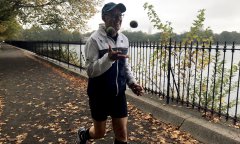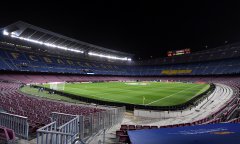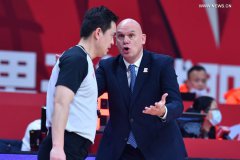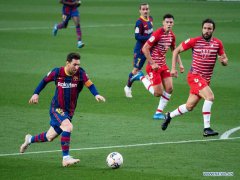Coaches still questioning controversial decision to cancel NCAA women's golf regional
via
May 13, 2021, 6:29 PM
6 min read
Share to FacebookShare to TwitterEmail this articleWhen the NCAA committee decided to cancel the women's golf regional tournament in Baton Rouge, Louisiana, on Wednesday, it left participating coaches and players perplexed as to how the decision was made.
The University Club golf course had taken on 7 inches of rain over three days and had standing water on select holes and bunkers throughout the course. NCAA committee representative Brad Hurlbut declared the course was playable but not up to a championship level, which left coaches asking what exactly that meant.
"I've never seen that. I've played pro golf. I've played NCAA regionals as a player. I've coached it. I've played in the U.S. Amateur, and I've never seen this," Sam Houston women's golf coach Brandt Kieschnick said. "It was the committee and the rules official, and I don't know why they came to that conclusion, but it's mind-boggling."
Miami coach Patti Rizzo said Thursday during an interview with SportsCenter that she didn't like "seeing all the girls so stressed out."
"It's supposed to be a memorable, exciting experience," said Rizzo, who added that players were crying and confused by the decision. "It's a really sad situation."
The teams had a practice round Sunday with course conditions that were dry. Rain came down Monday morning, which was scheduled to be the first day of the tournament, and play was called for the day at 11:30 a.m. ET.
According to Kieschnick, the sun was out Monday from noon on and there was a full eight hours of sunshine that could have allowed play later in the day. That option wasn't discussed, however, and Kieschnick did not witness any maintenance crew attempting to get the golf course ready for play.
A similar scenario played out Tuesday, but the teams were allowed to practice on the course later that day.
"I walked a little bit of the course; it was playable. The water had receded a little bit; there was maybe one hole that we'd have to move from a par-4 to a par-3," Kieschnick said. "A few of us coaches midafternoon went to the committee with questions and said, 'What can we do to play? We'll do whatever we have to do.'"
The coaches were told the bunkers on the course were a concern, with standing water making them unplayable. The rules officials did have the option to mark the unplayable bunkers as such, which would give the players relief if their ball entered the marked area.
"I specifically asked the head rules official why we can't play, what do we have to do," Kieschnick said. "The answer was that 'We don't think you get the right champion if we don't play the bunkers.' I said, 'Well, you're well within your rights to make those ground under repair; that's truly your opinion.' You don't know if that determines the right champion or not -- that's an opinion."
Approximately 12 coaches from the participating teams went to the games committee Tuesday to get some questions answered. The objective was to determine whether there was a way to resume golf and a way to get the tournament in by the Thursday deadline.
Part of what confused the coaches was that the bunkers and standing water were presented as the big issue but they did not see an attempt to clear the water or repair the course. According to Kieschnick and another source, there were no pumps on site to pump the water off the course.
"A great coach said, 'If bunkers are the problem and you're doing nothing about the bunkers, we ought to leave right now,'" Kieschnick said. "That was on Tuesday. They didn't want to take the bunkers out, but this happens all the time and we can do this. When bunkers are the problem and nothing is being done, that's really hard to swallow. It was bizarre."
On Wednesday morning, the teams were delayed from their morning start, with it pushed back to 10 a.m. and then to 11 a.m. without communication from the committee.
Kieschnick and a few other coaches went to the clubhouse to try to talk to the committee but could not gain access to the members and didn't have communication with them until the final decision was announced to call the tournament later Wednesday.
He had reached out to the NCAA on Tuesday night to ask what could be done; sent a text on Wednesday morning asking what was going to happen, without answer; and eventually, along with his players, heard the decision from Hurlbut.








